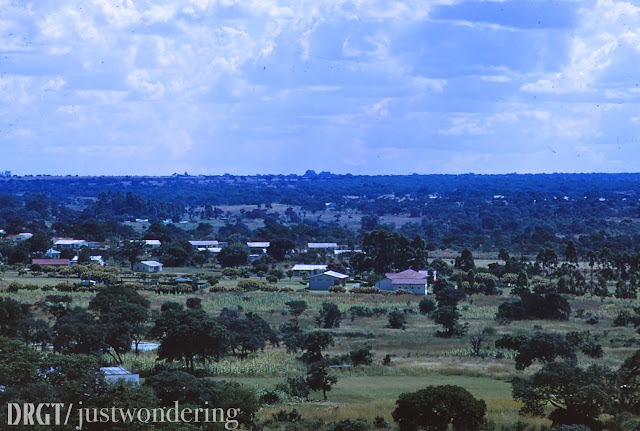Where we are teaches us a lot about who we are.
I am a Californian, born and bred.
Oceans, mountains, deserts -
these are in my blood,
part of my psyche.
Cycles of wet and dry,
hot and cold,
sail-filling winds and
soul-slowing stillness -
these are part of me now,
not to be separated out,
placed on a shelf somewhere
like a seldom-read geography tome.
The real geography of this place is part of my soul.
Perhaps that's why the geography of a different place,
a faraway place,
never felt alien to me.
I ran to it, embraced it, let it fill me up -
as much as a 21-year-old is capable of such rapture.
It was dusty and dry much of the year.
And as a Californian, this look I knew.
But anything short of jungle could grow there,
and grow it did, all over the savannah.
And all around the edges of our small neighborhood,
with its dirt roads and driveways,
its brick houses, wide-open sky views, flat-topped trees
and all that red clay, just beneath the dust.
Grasses of all kinds flourish in this climate,
turning brown in the dry season,
but bright green when watered by seasonal rains.
The cloud formations were breathtaking,
the ground fog during 'winter' was not.
Much like California, we enjoyed three seasons
in Zambia rather than four:
Hot and dry,
warm and wet,
cold and foggy.
When we first drove onto the campus, we were flabbergasted
to see tall poinsettias - and they bloomed every year,
bringing spots of bright color to the green and brown.
The shady side of our new home encouraged calla lilies and
coleus in every color combination.
The front yard featured a row of bright coral-colored
flowers I had never seen before -
gerbera daisies,
always twisting toward the sunlight.
Our campus was completely flat,
making it an ideal space for soccer matches -
a sport new to us in 1966.
My husband learned it well enough to coach it;
neither of us learned to love it.
We lived about two miles off of the Cape-to-Cairo road,
a main thoroughfare going north and south on the continent
of Africa. Our town of about 2000 was a delightful place,
where something interesting was always bound to happen.
There was a hospital, a small elementary school,
two general stores,
a butchery,
a bakery
and a small book store,
run by the church we served with.
Acacia trees graced the southern entry to Choma,
sheltering the post office at that end of town.
And the train stopped in Choma, too.
A steam train - just like the picture on the sign below.
And we rode that train about twice each year,
sleeping overnight,
waking with cinders in our hair and on our clothes.
It was in our local train station, the first week we arrived,
that I had one of the most profound experiences
of my young life.
My husband and I got separated for a moment just as a train pulled up. Surrounding us was a veritable sea of Africans,
waiting to meet friends and family
or to board the train for a new destination.
Every single face around me looked
different from mine.
Every one.
And like a shot to the gut,
I had just the tiniest inkling of what it feels like
to be the minority - for the first time in my life.
This is an insight that simply cannot be bought,
or even taught,
and I am grateful for it.
The bus stop was right outside the bookstore,
across the street from the bakery.
Bags and babies hung from every window,
from every baggage strut,
and the energy of a newly born country
poured out into the street.
This is the local police,
and this is the fire department.
There was one house fire in the two years we lived there,
and this team successfully extinguished it.
One of the two banks in town, about to have its
name changed as the nation of Zambia was four years old
at this point. Any reference to its former name
(Northern Rhodesia) was being eliminated.
Note the drug store next door - called the Chemist.
As a former colony, many Britishisms remained.
A young mom, baby on back, getting ready to cross the street.
I don't think she had to wait long.
Every once in a while, a touring car would
whiz by, making a stop for supplies or refreshments.
This was a highlight for the local community.
We met Australians, South Africans, Germans
as they were heading either north or south on the transcontinental highway.
At the other end of the transportion spectrum,
we sometimes saw this coming down the main street.
Cattle were visible signs of wealth in Bantu society.
The Tonga tribe was the main group living in the
southern province, and despite the fact that it was
officially against the law of the land,
brides were bought and sold . . .
with cattle - lobola must be paid.
These gentlemen are the tribal elders
and it was their primary job to palaver,
to meet and talk.
Every day. All day. About anything and everything.
I never did get used to that as a know-it-all
20-something.
Looking back as a knows-very-little-indeed 60-something,
I believe this constant communication
contributed to the well-being of both the
tribe and the family.
Things got thoroughly talked through
before hostility developed.
This nice looking man was proud to be the owner
of a rifle and he asked me to take this picture.
I was happy to oblige.
We lived at an elevation of just over 4000 feet and it was suggested that at least once a year,
we travel to sea level to take a break,
get a little richer oxygen and basically rest up.
We did that exactly once.
My husband's parents and younger sister
visited us the second summer we
were there, and the five of us took a wonderful trip
which I will write about sometime soon.
But one place we could get to in an afternoon
was about 120 miles south of us.
From this angle, a peaceful river.
From this one, a glimpse of why the local people called
this place, "the water that thunders."
Victoria Falls, one of the wonders of the modern age.
Astounding, spectacular, magnificent - words fail.
Completely fail.
My husband took a truck load of students there on
a field trip one year.
Not one of them had ever seen it.
Not one.
One hundred and twenty miles.
It is the landscape of a place that gets in under the skin.
The contour of the land,
the shape of the sky,
the colors of the plants and flowers,
the presence - or absence - of water.
And this is a landscape that fed my soul,
that invited me to grow,
that gave me hope,
that taught me about time and seasons
and hard work and good rest.
This is the landscape in which I became
an adult,
a wife,
a mother,
a more careful critic of the church,
a searcher after God's deep truth,
and a whole lot less of a know-it-all.
I am grateful.
Joining with Jennifer and Duane, if he's open this week,
Emily, if she's open and Ann's Wednesday group.
Better late than never, right??





























